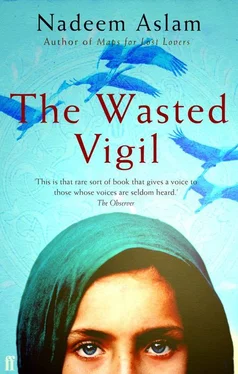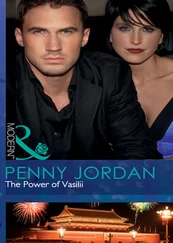Nadeem Aslam - The Wasted Vigil
Здесь есть возможность читать онлайн «Nadeem Aslam - The Wasted Vigil» весь текст электронной книги совершенно бесплатно (целиком полную версию без сокращений). В некоторых случаях можно слушать аудио, скачать через торрент в формате fb2 и присутствует краткое содержание. Год выпуска: 2009, Издательство: Faber and Faber, Жанр: Современная проза, на английском языке. Описание произведения, (предисловие) а так же отзывы посетителей доступны на портале библиотеки ЛибКат.
- Название:The Wasted Vigil
- Автор:
- Издательство:Faber and Faber
- Жанр:
- Год:2009
- ISBN:нет данных
- Рейтинг книги:4 / 5. Голосов: 1
-
Избранное:Добавить в избранное
- Отзывы:
-
Ваша оценка:
- 80
- 1
- 2
- 3
- 4
- 5
The Wasted Vigil: краткое содержание, описание и аннотация
Предлагаем к чтению аннотацию, описание, краткое содержание или предисловие (зависит от того, что написал сам автор книги «The Wasted Vigil»). Если вы не нашли необходимую информацию о книге — напишите в комментариях, мы постараемся отыскать её.
The Wasted Vigil — читать онлайн бесплатно полную книгу (весь текст) целиком
Ниже представлен текст книги, разбитый по страницам. Система сохранения места последней прочитанной страницы, позволяет с удобством читать онлайн бесплатно книгу «The Wasted Vigil», без необходимости каждый раз заново искать на чём Вы остановились. Поставьте закладку, и сможете в любой момент перейти на страницу, на которой закончили чтение.
Интервал:
Закладка:
*
David climbs the staircase leading to the roof of the house. At times he had been within touching distance. What Marcus’s house lacked, he had thought then, was a room dedicated to the sixth sense. Something that allowed you to identify a fragrance that wasn’t there. A third eye and a third ear, the second skin, the second mouth.
Only three yards away from him in that deep-blue darkness, he had held his breath as the boy approached the door behind which the two women were asleep. But he had just gone past it, moving along the corridor.
He’d come for a picture book. It was the volume Zameen had craved during her exile in Peshawar. Now he looks down from the roof. He sees Casa emerge from the house in a hurried skulk, holding the big book under his arm. Like a wolf in a fairytale stealing an infant, running on hind legs into the forest, he sees him enter the large glasshouse. His flashlight comes on. During earlier times there had been topiary animals and birds at various locations around the house, trained by Marcus himself. After years of war and absence they outgrew their shapes, though Marcus brought some of them back when the war with the Soviet Union was over. Later the Taliban came and they would have destroyed them definitely, for being representations of living things, had he not transferred them to pots and dragged them into the glasshouse one by one, letting them outgrow themselves safely in there. The ammonite and the panther died from shock but others reverted to being undisciplined shrubs. He told David that he thought of them, the creatures, as hiding for safety in that foliage.
Drought has killed them but they continue to stand dead in their pots, the sap petrifying in the veins. On occasion Marcus still goes in and clips them, trying to remember the long-ago shapes lost in the brown dry twigs and the brittle leaves.
Through the dusty panes he can see Casa in there, holding the yellow light in one hand, the book in the other. There is half a grizzly bear near him. A hoopoe in flight, also unfinished, the untrimmed mass of branches making it seem it is flying while on fire. There is a flamingo. In his journal the Emperor Babur recorded seeing thousands of them in Afghanistan in 1504.
8. The Caliphate of New York
MUHAMMAD ASKED MUSLIMS not to do anything untoward in the vicinity of orchards, as that would offend the angels who are appointed by Allah to protect fruit trees, keeping foraging creatures at bay.
David looks onto the orchard from the highest room in the house, his arms folded on the window sill as he leans out into the breeze. The array of flowers ghostly at five a.m. He’s just come out of sleep, having had the dream again. Someone, David can never see the face, walks away from him in a rainstorm. At the moment of separation the falling of each raindrop comes to a halt, each sphere of water hanging in the air. A perpetual and sorrowful present tense for him. But the departed figure has cleared a corridor through all that suspended grey and silver water. David enters this strange tunnel and begins the journey at the end of which lies a meeting. He awakens always before he can arrive.
He looks towards the glasshouse. When he went to bed Casa was still in there with the book, but he’s gone now. He must be asleep in the perfume factory, down there where women and men used to work at one time, amid night-blooming night-dying jasmine. Cyclamen. Ginger and rose and cardamom. Coming from Usha and descending the stairs, going down a layer into their country’s past.
The mountain range above the house is faintly luminous, dawn not far away.
Back in 1981 Zameen and Benedikt — having escaped from the Soviet military base — had hidden in an orchard during an hour like this. With the first rays of the sun the branches above Zameen had burst into flower. Benedikt would never find his way back to her now. Zameen said she had continued to make her way towards Usha on her own. She hid herself as she neared the house, seeing armed strangers in the vicinity, the flowerbeds trampled. The resistance fighters had taken over the building, but where were her parents? She waited all day and went forward only when the sun vanished. She descended into the perfume factory, and she stopped at the fourth step up from the floor when her foot landed on an object. She leaned down to investigate. A gun. She sent out her arm in an arc and discovered that there were many more. In fact the entire floor of the factory was covered thickly with them, a heap of weapons that — like a flood — submerged one of the Buddha’s eyes, one nostril, and a third of the mouth. She stumbled as she walked on the piled-up guns and went past the stone head. In a far corner, digging through all that metal death as silently as she could, she managed to open a cupboard — taking out the small bottle of the perfume that her father had blended for her. A glass world in her hands.
She went to the graveyard in Usha but among the new mounds she couldn’t see the grave of the beloved boy who had been shot the night she was apprehended by the Soviet soldiers.
Bihzad was born more dead than alive seven months later, under a thorn tree as she was making her way towards Pakistan. She had discovered she was carrying Benedikt’s child during the initial stages of this journey that took her from village to village, a time of slow progress during which she was accompanied by other refugees, the number varying, some picked off by Soviet fire from above, some by cholera or exhaustion or the heat. Pakistan, Pakistan, Pakistan. In their own country the land wanted to strike them dead and so did the sky, and everyone wanted to get to a refugee camp in Pakistan where their suffering would come to an end at last. Scouts who guided refugees to Pakistan — across desert, river, stone, across bandit territory, wolf territory — demanded money she did not have. She gave birth prematurely inside the blue tepee of a burka, planting a long stick in the earth and draping the cloak over it, opening it wide and weighing down the edges with rocks. If the tree above had been shorter she would have detached its long thorns to pin the hem to the ground. Smoke from the candle escaped through the embroidered eye-grille and disappeared into the dead branches of the tree. At that stage of her travel there were no adults with her, only three children who remained on the other side of the tent that night, falling asleep as the darkness increased. She had found one of them a month ago wandering half-mad through the wilderness, having run away from the refugee caravan that had contained his family — he was ten and wanted to go back home to his village and fight the jihad against the Soviets.
Two hours or so after Bihzad was born she heard the helicopters pass overhead. She managed to move her body and look out of the pleated cone. In the darkness something landed on her brow and bounced off. There was a noise of many small objects landing close to her. It was as though someone were throwing pebbles or large twigs in her direction. She lifted the candle out into the night and in the two moments it took for a gust of wind to extinguish it she saw that a butterfly mine was lying directly in front of her, dropped by the helicopters, saw that the sleeping children were covered with them. She could imagine how the night was full of others that were still descending. The Soviets had designed them especially for use in this war. Made of green plastic and shaped like butterflies or sycamore seeds, with a wing to allow them to spin to earth slowly. The Soviets were known to have dropped mines disguised as actual toys onto villages — dolls and colouring pens, bright plastic wristwatches. Things designed to attract children. They fell from the air into houses and streets and the result was meant to encourage parents to vacate a village, a place where children were no longer safe. These villages harboured guerrillas and had to be emptied any which way. And hundreds of thousands of the green butterfly mines were being used to hinder guerrilla passage to and from Pakistan.
Читать дальшеИнтервал:
Закладка:
Похожие книги на «The Wasted Vigil»
Представляем Вашему вниманию похожие книги на «The Wasted Vigil» списком для выбора. Мы отобрали схожую по названию и смыслу литературу в надежде предоставить читателям больше вариантов отыскать новые, интересные, ещё непрочитанные произведения.
Обсуждение, отзывы о книге «The Wasted Vigil» и просто собственные мнения читателей. Оставьте ваши комментарии, напишите, что Вы думаете о произведении, его смысле или главных героях. Укажите что конкретно понравилось, а что нет, и почему Вы так считаете.












